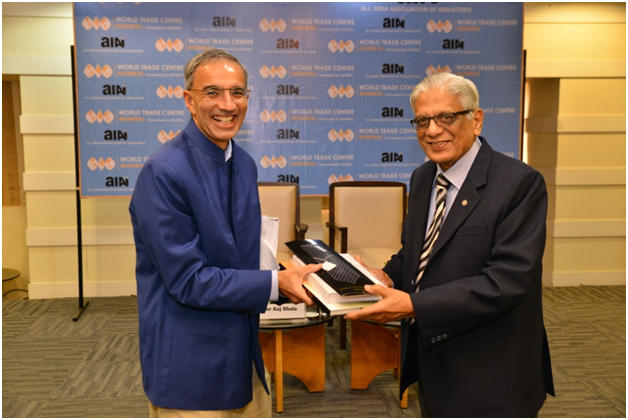“There is a great pressure on the Indian government to frame a Free Trade Agreement (FTA) Policy as the trade liberalization process under the aegis of World Trade Organization (WTO) has hit the slow lane. The slowdown in the process of trade liberalization at the multi-lateral level has prompted nations across the globe to sign FTAs, bilateral trade agreements and plurilateral trade agreements. In order to ensure that India is not left behind in this race for preferential trade agreements, the government must frame a comprehensive policy on FTAs,” said Mr Raj Bhala, Rice Distinguished Professor and Associate Dean for International and Comparative Law, School of Law, University of Kansas, USA at the lecture on ‘Recent Developments in International and Indian Trade Law and Policy’ jointly organized on 19th March 2015 by MVIRDC World Trade Center and All India Association of Industries .
The professor also suggested that India should become a member of the Trans-Pacific Partnership (TPP) instead of taking efforts to forge a Regional Comprehensive Economic Partnership (RCEP) as the latter is a time-consuming initiative. India has a wider scope to benefit from TPP, which includes countries with different comparative advantage, than from RCEP. Although, some of the contentious issues in TPP may not be in favour of India – these issues include rule of origin, TRIPS, Investor-state dispute settlement (ISDP) – India would benefit by being forced to implement trade reforms as part of the mandate of TPP, he said.
While entering into a membership agreement with TPP, the Indian trade negotiators must ensure that the clauses in the agreement would led to reallocation of productive resources to sectors where India has comparative cost advantage. While such an agreement and the resulting trade reforms may involve short-term pain in terms of loss of jobs in some sectors. In the long run it may benefit the entire economy by channeling resources in the most internationally completive sector.

Meanwhile, expressing concern about the current pace of trade liberalization professor Bhala said, it has hit a slow lane in recent years after the initial progress in terms of agreement in most-favoured nation (MFN) norms, elimination of quantitative trade restriction etc, Bhala observed. For example, members of the WTO are struggling to arrive at a consensus on sensitive issues in the trade on agriculture like public stock holding, tarrification, and export subsidy. Bhala commented that in this time of preferential trade agreements, the role of WTO is reduced to dispute settlement, provision of trade statistics and research, and acting as a negotiating forum on key issues of trade.
Earlier in his welcome address, Mr. Y.R. Warerkar, Executive Director, MVIRDC World Trade Center said that international trade law is a complex and an ever expanding area. It includes the appropriate rules and customs for handling trade between countries. Speaking on the World Trade Center Mumbai’s efforts and as a key catalyst in promoting India’s international trade, he said that the topic chosen for the lecture was most apt. In conclusion, Mr. Warerkar emphasized that in the present complex business environment, it is imperative for any business to understand the intricacies of trade laws both in the national and international context.
Ms. Khyati Naravane, Assistant Director – Trade Promotion, MVIRDC World Trade Center proposed the vote of thanks.

 : +91 7718886506
: +91 7718886506